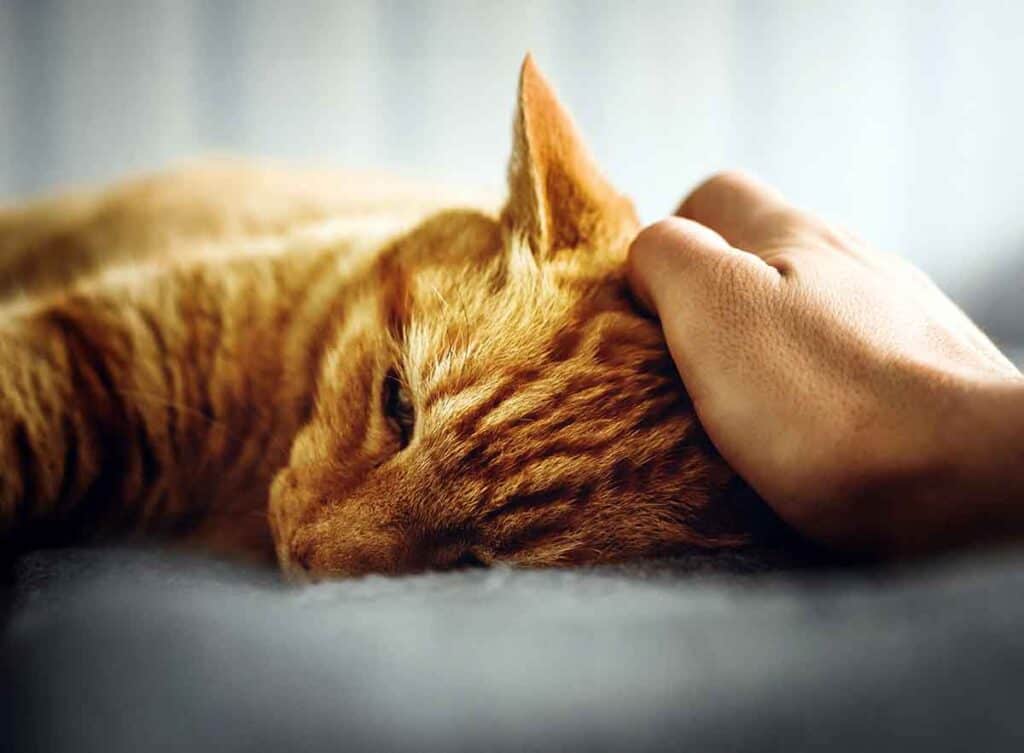Last updated on January 25th, 2024 at 10:37 pm
If you are a cat owner, you’ve probably had to face the worry that comes with wondering if your pet is sick. It can sometimes be difficult to tell the difference between everyday behavior and signs of distress or illness. So how do you tell if your cat is sick?
Cats that are sick will often have changes in behavior, such as reduced appetite, drinking more than normal, lethargy, hiding, excessive vocalization, or changes in litter box habits. Other signs include vomiting, diarrhea, rapid weight loss/gain, hair loss, or difficulty breathing.
In this article, we will explore some common warning signs that could mean your cat needs medical attention from a veterinarian. Read on to find out more about what things you should look for if you think your cat may be sick.
Importance Of Recognizing Signs Of Illness In Cats
Cats are skilled at hiding their symptoms. Unlike dogs, who may whine or cry when they’re not feeling well, cats are stoic creatures who often show only subtle signs of pain and illness.
This means that a cat may be sick for some time before their owner realizes that there is a problem. If left untreated, illnesses in cats can quickly become more serious and more difficult to treat.
For example, a urinary tract infection can quickly turn into a blockage, which can be life-threatening. Diabetes, if left untreated, can lead to a range of health problems, including blindness and kidney failure.
By recognizing the signs of illness in cats early, owners can take their cats to the vet and get the treatment they need. Early detection not only helps the cat recover more quickly, but it can also save the owner money in the long run, since treating a problem early is generally less expensive than treating a problem that has been allowed to progress.
How To Tell If your Cat Is Sick
When it comes to understanding your cat’s health, knowledge is power. The following are some typical signs that could suggest a problem:
- Decreased appetite
- Drinking more than normal
- Hair loss, redness of skin, sores or scabs
- Bad breath
- Difficulty eating
- Limping
- Swelling, open wounds
- Eye or nose discharge
- Visible or drooping third eyelid
- Sneezing, coughing, wheezing
- Rapid breathing
- Changes in urination or defecation
- Vomiting
- Diarrhea
- Rapid weight loss or weight gain
- Excessive vocalization
- Hiding
- Lethargy or decreased activity
Let’s start by taking a closer look at the symptoms that could indicate have have a sick cat on your hands. Keep in mind that cats often try to hide the fact that they are sick, so subtle changes may not be obvious unless you are looking for them.
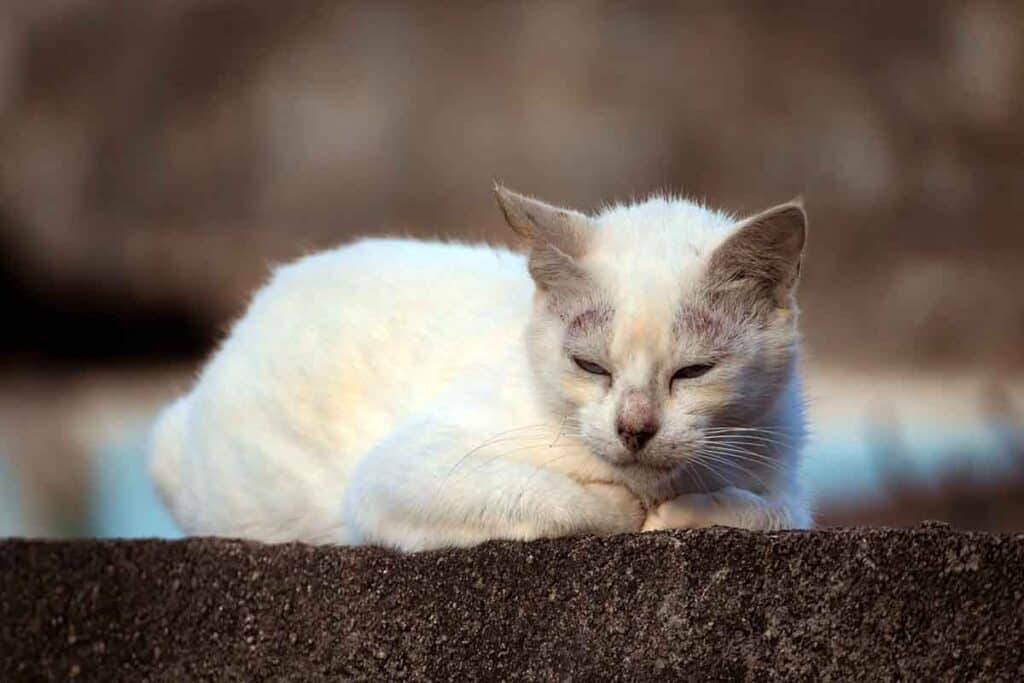
General Signs Your Cat Is Sick
General signs that your cat is sick include changes in behavior, such as reduced appetite, lethargy, hiding, or excessive vocalization.
Reduced Appetite
Reduced appetite, also known as anorexia, can range from your cat eating less food or completely avoiding food altogether.
One of the most common reasons cats lose their appetite is when they are experiencing pain or discomfort from an underlying medical condition, which can make eating or drinking difficult or unpleasant.
Other reasons for a loss of appetite in cats may include the side effects of medications, infections, illnesses, or environmental changes. Cats can also become depressed or anxious, leading to a loss of appetite.
In addition, dental disease, such as gum disease or tooth decay, can cause pain when chewing, leading to a reduced appetite. Some cats may also experience a loss of taste or smell, which can make food less appealing.
Drinking More Than Normal
Drinking more than normal, also known as polydipsia, can be a sign of a medical problem. Polydipsia can manifest as increased thirst or a frequent need to drink water.
One of the most common reasons for increased drinking in cats is kidney disease, which is a common health condition in older cats and certain breeds like Persian or Exotic Shorthair cats.
Other medical conditions that can cause polydipsia include diabetes, hyperthyroidism, liver disease, and urinary tract infections. In some cases, medications or dietary factors may also cause increased drinking.
Changes In Litterbox Habits
Cats are generally fastidious and will typically use their litterbox regularly, so any sudden appearance of litter box issues is a clear warning sign that something is wrong.
Straining or difficulty urinating can be a sign of urinary tract infection or blockage. Other signs or urinary problems may include frequent urination, blood in the urine, or urinating outside of the litterbox.
Diarrhea or constipation, can also indicate an underlying health issue.
Many different health conditions can cause changes in litterbox habits in cats. These include urinary tract infections, bladder stones, kidney disease, diabetes mellitus, and thyroid problems, among others.
In some cases, changes in litterbox habits may be related to dietary factors, environmental changes, or stress.
Lethargy
Lethargy is a lack of energy, motivation, and enthusiasm for normal activities. It is often described as an overall sense of weakness or fatigue.
A cat with a decreased energy level will be sleeping more than usual, and it may be less interested in playing or socializing with other cats or their human companions. They may also show less enthusiasm for grooming themselves, which can result in a dull and unkempt coat.
Some common medical causes of lethargy include infections, anemia, kidney disease, liver disease, heart disease, and diabetes. In some cases, lethargy can be a side effect of medication or the result of an underlying injury, or even psychological factors such as stress or anxiety
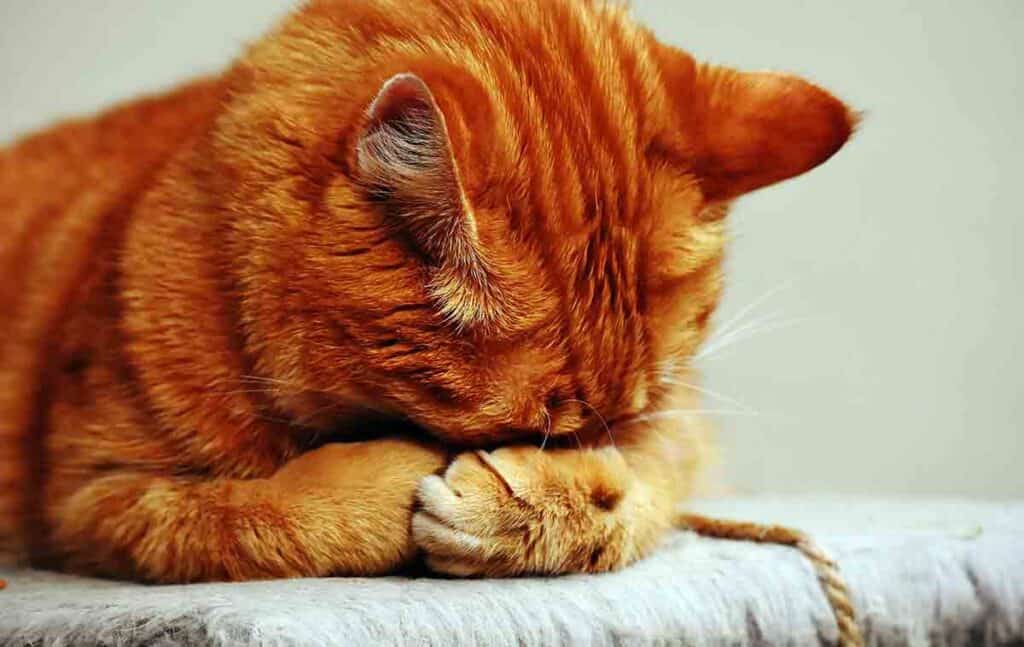
Hiding Or Avoiding Social Interaction
Cats are social animals and typically enjoy being around their human companions. If your cat has a sudden change in behavior and is avoiding social interaction, they may have a medical problem.
This behavior stems from their evolutionary history as solitary hunters that needed to avoid predators when they were vulnerable due to illness or injury. As a result, cats may instinctively seek out a quiet, secluded place to rest and recover when they are not feeling well.
Cats that are experiencing pain or discomfort may prefer to hide away from others to rest and minimize any additional stress or discomfort. Similarly, cats that are experiencing stress or anxiety may prefer to hide away from social interaction to reduce their exposure to potentially stressful situations.
Excessive Vocalization
If a cat is feeling unwell, they may meow excessively to signal their distress or ask for assistance, especially if they are in physical discomfort or pain.
In addition to vocalizing their discomfort, cats may also meow more to get attention from their owners, seeking comfort or attention from their owners. Cats that are experiencing stress or anxiety due to illness may also meow more as a way of expressing their distress.
Physical Signs Your Cat Is Sick
Physical signs are one of the most visible and immediate indications that your cat may be sick.
Weight Gain
Obesity by itself is a health issue in cats and can lead to a range of other health problems, including diabetes, joint pain, and heart disease. But weight gain can also be a sign of other underlying health conditions, such as Cushing’s disease, which is caused by an overproduction of cortisol in the body. Cushing’s disease can cause rapid weight gain in cats, especially around the belly.
In some cases, weight gain may be related to a change in activity level such as decreased activity due to underlying reasons like arthritis.
Weight Loss
Weight loss is a common sign of illness in cats. In some cases, weight loss may be a gradual process, while in others it may be sudden and dramatic.
Diseases causing weight loss in cats include hyperthyroidism, diabetes, kidney disease, and cancer, among others. In addition to weight loss, these conditions may also cause other symptoms such as increased thirst or urination, lethargy, and changes in appetite or behavior.
Weight loss can also be a sign of periodontal disease or gastrointestinal issues, such as inflammatory bowel disease or a parasite infestation. These conditions can make it difficult for your cat to eat and digest their food properly, leading to weight loss.
Hair Loss
One of the most common health reasons for hair loss is an allergic reaction. Allergies can cause inflammation and itching, leading to hair loss as a result of excessive scratching.
Another cause of hair loss in cats is parasitic infestations. Fleas, mites, and other parasites can cause itching and irritation, which can lead to hair loss as your cat scratches or bites at its skin.
Diseases such as hyperthyroidism, which is a condition that causes the thyroid gland to produce too much hormone, can lead to changes in the skin and haircoat. Cushing’s disease, which is caused by an overproduction of cortisol, is another example of a disease that can cause hair loss in cats.
Cats that are suffering from stress, anxiety, or depression may groom themselves excessively, which also leads to to hair loss.
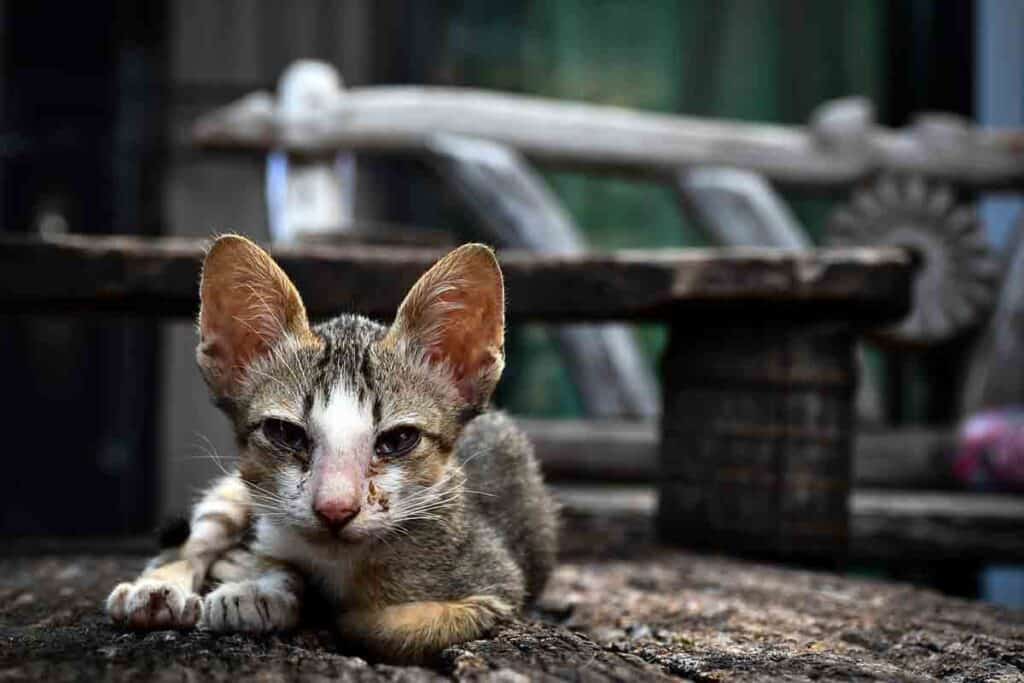
Changes In Grooming Habits
Some cats may groom themselves excessively when they are feeling anxious or stressed, while others may groom less when they are not feeling well. A cat that is grooming too much may have bald patches or irritated skin from excessive licking or scratching, while a cat that is grooming too little may have an unkempt or dirty coat, with visible matting, tangles, or debris. They may even have an unpleasant odor.
Cats that are in pain may be less likely to groom themselves, as it can be physically taxing. In addition, cats with dental problems, arthritis, or other medical conditions may find it difficult or painful to groom themselves.
Some cats may excessively groom themselves when they are experiencing skin irritations, such as with flea infestations that cause intense itching. Cats that are feeling anxious or stressed may over-groom themselves as a coping mechanism.
Vomiting
Vomiting can be a normal bodily response to expel something that the cat has ingested, such as a hairball or a foreign object. It can sometimes occur with a mild, passing bout of indigestion. However, in other cases, vomiting can be a sign of a serious underlying medical condition such as gastrointestinal problems, kidney disease, liver disease, or pancreatitis.
Reasons for vomiting in cats include, but are not limited to:
- Hairballs: Cats groom themselves by licking their fur, and in doing so, they ingest loose hairs. These hairs can accumulate in the stomach and form a hairball, which can cause discomfort and lead to vomiting.
- Dietary issues: Cats may vomit if they eat too quickly or eat something that disagrees with their stomach, such as spoiled food or a new type of food.
- Gastrointestinal problems: Inflammatory bowel disease, gastrointestinal infections, and other gastrointestinal problems cause stomach upset and pain that leads to vomiting.
- Kidney disease: As kidneys fail, they can no longer filter out toxins in the blood. The buildup of toxins often leads to vomiting as the body attempts – and fails- to get rid of the toxins.
- Liver disease: The liver also filters toxins from the blood and, as liver function decreases, toxins build up. As with kidney disease, vomiting is the body’s attempt to eliminate toxins.
The appearance of cat vomit can vary depending on the cause of the vomiting. For example, hairball vomit typically looks like a long, cylindrical mass of hair, while vomit from dietary issues or gastrointestinal problems may contain undigested food or stomach acid. Vomit that contains blood or is a yellow or green color may indicate a more serious medical condition.
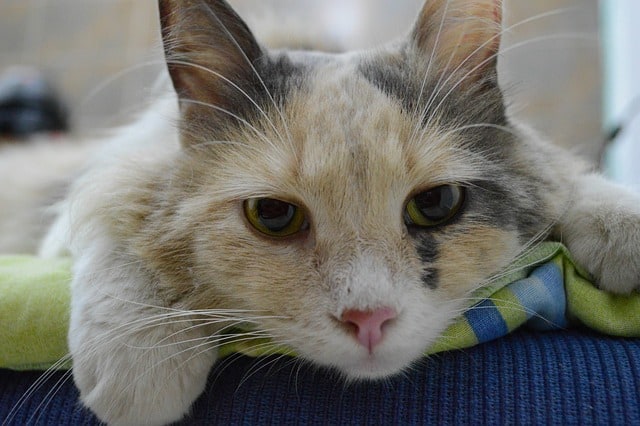
Diarrhea
Diarrhea can be a normal bodily response to something the cat has ingested, such as a change in diet or eating something they shouldn’t have.
Common causes of diarrhea include:
- Dietary issues: Change in diet is probably the most common cause of diarrhea in cats. They can also get diarrhea if they are sensitive to certain ingredients in foods they eat.
- Gastrointestinal problems: Inflammatory bowel disease, intestinal infections, and other gastrointestinal problems can cause diarrhea in cats.
- Parasites: Intestinal parasites such as roundworms, hookworms, and giardia can cause diarrhea in cats.
- Stress: Stressful situations, such as moving to a new home or the introduction of a new pet, can cause diarrhea in some cats.
The appearance of cat diarrhea can vary depending on the cause. For example, diarrhea caused by dietary issues may be a soft or loose stool, while diarrhea caused by gastrointestinal problems or infections may be watery and have a foul odor.
Injuries
Injuries are common in cats, especially for those that are outdoor cats. They can get injured in fights with other cats, falls, car accidents, or even sharp objects in the environment. .
Blood, cuts, scratches and torn skin are obvious signs of injury. Another obvious sign of injury is limping or favoring a specific leg or paw. An injury may result in swelling or bruising, which can be hard to detect through the cat’s fur.
Injuries can also cause your cat to be lethargic or inactive. Cats will instinctively move around less and sleep more than usual to avoid the pain of their injury.
In some cases, injuries can cause internal bleeding. Signs of internal bleeding or serious injury include pale gums, difficulty breathing, or loss of consciousness.
Breathing Problems
Breathing problems should always be taken seriously. If you notice that your cat is having trouble breathing or is breathing rapidly, it is important to seek veterinary attention immediately since lack of oxygen is life-threatening..
A common cause of breathing problems in cats is asthma, which is a chronic respiratory condition that can lead to difficulty breathing, coughing, and wheezing.
Allergies and upper respiratory infections can also cause breathing difficulties in cats. These conditions can lead to inflammation in the respiratory system, which can result in rapid or labored breathing, coughing, and other symptoms. A damaged respiratory system is prone to secondary bacterial infections, which can make the situation much worse.
Heart disease also causes breathing problems in cats. When the heart is not functioning properly, it can cause fluid to accumulate in the lungs, leading to breathing difficulties.
Other health conditions that affect the respiratory system, such as cancer or pneumonia, can also lead to breathing problems.
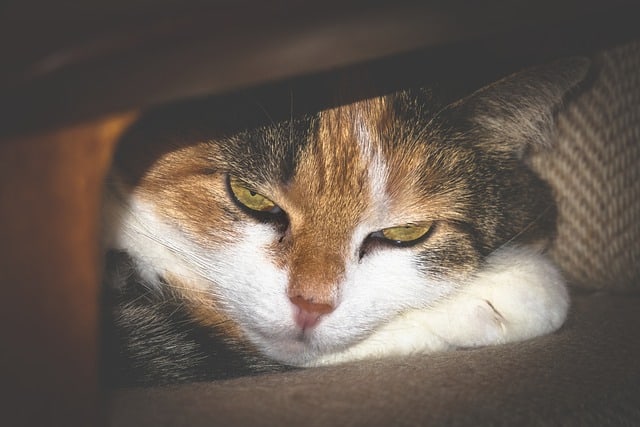
What To Do If You Think Your Cat Is Sick
If you think that your cat is sick, take action as soon as possible. Early intervention can help prevent the illness from getting worse and improve the chances of successful treatment.
Here are some steps you can take if you think your cat is sick:
- Observe your cat: Keep an eye on your cat’s behavior and look out for any signs of illness such as vomiting, diarrhea, lethargy, loss of appetite, or changes in behavior. Make note of any symptoms or changes and share them with your veterinarian.
- Contact your veterinarian: If you notice signs of illness, contact your veterinarian as soon as possible. They will be able to guide the next steps and may ask you to bring your cat in for an examination.
- Prepare for the veterinary visit: Before your vet appointment, prepare a list of symptoms or changes you have observed in your cat. Bring a stool sample if your cat has been experiencing diarrhea or vomiting. Make sure to also bring any medications or supplements your cat is currently taking.
- Attend the veterinary visit: During the veterinary visit, your cat will undergo a physical examination and may require diagnostic testing, such as bloodwork, X-rays, or ultrasounds. These will help get an accurate diagnosis of your pet’s condition and guide appropriate treatment.
- Follow the treatment plan: Once the cause of the illness has been determined, your veterinarian will recommend a treatment plan. This may include medications, dietary changes, or other therapies. It’s important to follow the treatment plan exactly as directed to ensure the best possible outcome.
How Do I Know If My Cat Has A Medical Emergency?
The following symptoms in cats are medical emergencies:
- Difficulty breathing: Cats that are panting, wheezing, or gasping for air are not getting enough oxygen. This is a medical emergency.
- Seizures: A cat that is having seizures needs to be taken to the vet immediately. Seizures can be caused by epilepsy, trauma, or poisoning.
- Profuse bleeding: Apply pressure to the wound to try to stop the bleeding and immediately take your cat to the vet.
- Inability to urinate or defecate: A blocked urinary or digestive tract can be life-threatening and requires urgent medical attention.
- Collapse or loss of consciousness: If your cat suddenly collapses or becomes unresponsive, immediate emergency care is needed.
- Suspected poisoning: If you suspect that your cat has ingested a toxic substance, such as rat poison or antifreeze, you should immediately take your cat to the vet.
In any of the above scenarios, it is important to remain calm and act quickly. Contact your veterinarian or an emergency animal hospital immediately for guidance on what to do next.
They may advise you to bring your cat in for immediate evaluation and treatment or provide instructions on how to stabilize your cat before bringing them in.
Have a plan in place for emergencies before they happen. Keep your veterinarian’s phone number and address easily accessible, along with the phone number for an emergency animal hospital.
Consider investing in pet insurance or setting aside an emergency fund for unexpected medical expenses.
By being prepared and knowing what to look for, you can help ensure that your cat receives the prompt medical attention they need in an emergency.
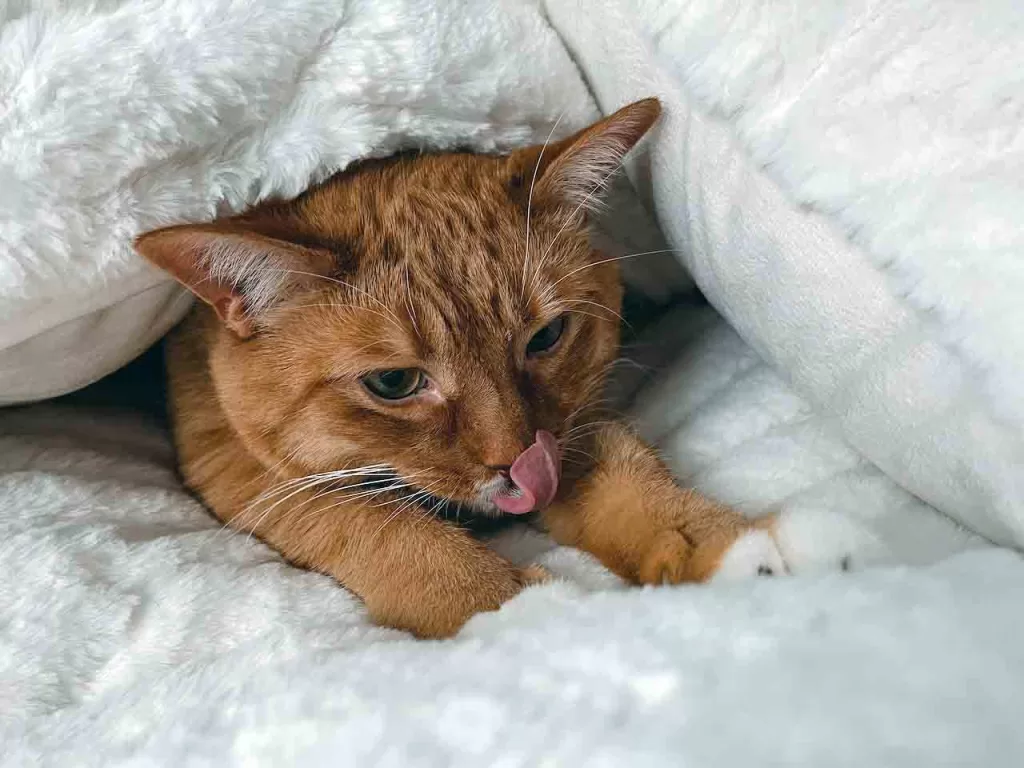
Conclusion
Knowing the signs of illness in cats will help you recognize when your cat needs medical care. From general signs like reduced appetite and lethargy to physical signs like weight loss and hair loss, being aware of any changes in your cat’s behavior or appearance can help you identify a potential health issue early on.
If you suspect that your cat may be sick or injured, contact your veterinarian as soon as possible to seek medical advice. Additionally, it’s always a good idea to keep your cat up-to-date on their vaccinations and regularly schedule check-ups to ensure their overall health.
Remember, as cat owners, our cats depends on us for their care, including their medical needs. By being vigilant and proactive in their care, we can help ensure they live a long and healthy life.
Disclaimer: This article is intended for informational purposes only, and does not constitute medical advice. Always consult your veterinarian if you have specific concerns about your pet’s health.

